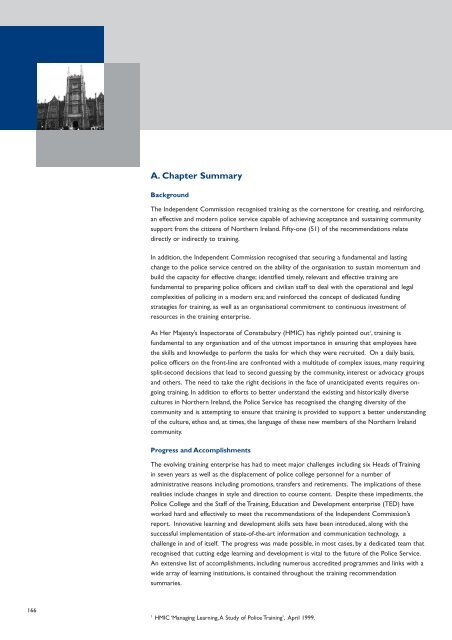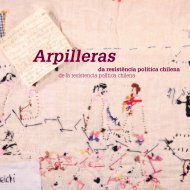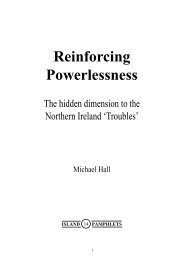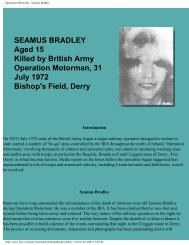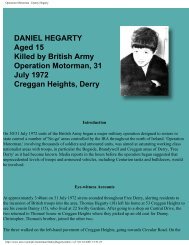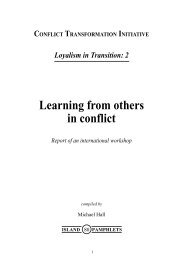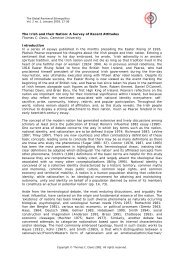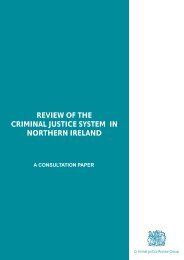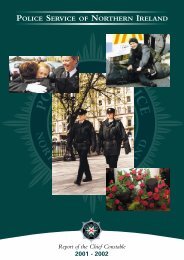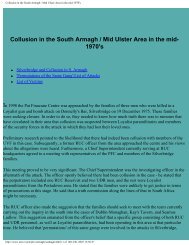11293 report 19 - CAIN - University of Ulster
11293 report 19 - CAIN - University of Ulster
11293 report 19 - CAIN - University of Ulster
Create successful ePaper yourself
Turn your PDF publications into a flip-book with our unique Google optimized e-Paper software.
A. Chapter SummaryBackgroundThe Independent Commission recognised training as the cornerstone for creating, and reinforcing,an effective and modern police service capable <strong>of</strong> achieving acceptance and sustaining communitysupport from the citizens <strong>of</strong> Northern Ireland. Fifty-one (51) <strong>of</strong> the recommendations relatedirectly or indirectly to training.In addition, the Independent Commission recognised that securing a fundamental and lastingchange to the police service centred on the ability <strong>of</strong> the organisation to sustain momentum andbuild the capacity for effective change; identified timely, relevant and effective training arefundamental to preparing police <strong>of</strong>ficers and civilian staff to deal with the operational and legalcomplexities <strong>of</strong> policing in a modern era; and reinforced the concept <strong>of</strong> dedicated fundingstrategies for training, as well as an organisational commitment to continuous investment <strong>of</strong>resources in the training enterprise.As Her Majesty’s Inspectorate <strong>of</strong> Constabulary (HMIC) has rightly pointed out 1 , training isfundamental to any organisation and <strong>of</strong> the utmost importance in ensuring that employees havethe skills and knowledge to perform the tasks for which they were recruited. On a daily basis,police <strong>of</strong>ficers on the front-line are confronted with a multitude <strong>of</strong> complex issues, many requiringsplit-second decisions that lead to second guessing by the community, interest or advocacy groupsand others. The need to take the right decisions in the face <strong>of</strong> unanticipated events requires ongoingtraining. In addition to efforts to better understand the existing and historically diversecultures in Northern Ireland, the Police Service has recognised the changing diversity <strong>of</strong> thecommunity and is attempting to ensure that training is provided to support a better understanding<strong>of</strong> the culture, ethos and, at times, the language <strong>of</strong> these new members <strong>of</strong> the Northern Irelandcommunity.Progress and AccomplishmentsThe evolving training enterprise has had to meet major challenges including six Heads <strong>of</strong> Trainingin seven years as well as the displacement <strong>of</strong> police college personnel for a number <strong>of</strong>administrative reasons including promotions, transfers and retirements. The implications <strong>of</strong> theserealities include changes in style and direction to course content. Despite these impediments, thePolice College and the Staff <strong>of</strong> the Training, Education and Development enterprise (TED) haveworked hard and effectively to meet the recommendations <strong>of</strong> the Independent Commission’s<strong>report</strong>. Innovative learning and development skills sets have been introduced, along with thesuccessful implementation <strong>of</strong> state-<strong>of</strong>-the-art information and communication technology, achallenge in and <strong>of</strong> itself. The progress was made possible, in most cases, by a dedicated team thatrecognised that cutting edge learning and development is vital to the future <strong>of</strong> the Police Service.An extensive list <strong>of</strong> accomplishments, including numerous accredited programmes and links with awide array <strong>of</strong> learning institutions, is contained throughout the training recommendationsummaries.1661HMIC ‘Managing Learning,A Study <strong>of</strong> Police Training’, April <strong>19</strong>99.


